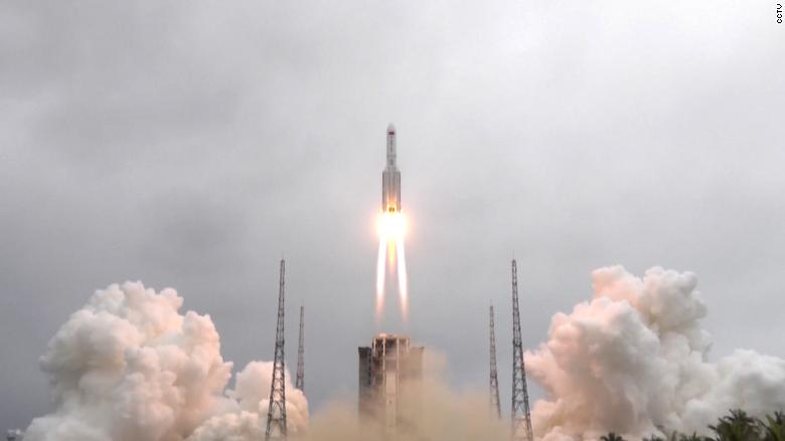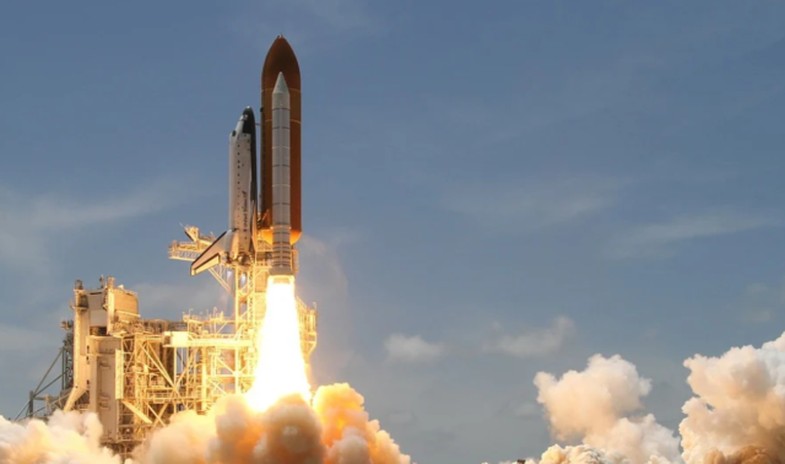
A large Chinese rocket that is out of control will return to the Earth's atmosphere this weekend, which has caused concern among people about the fact that its particles could cause damage. But what do experts say?
What happened?
The Long March 5B rocket from the Chinese space station was orbiting on April 29, but was then left to move in uncontrolled space, until Earth's gravity began to pull it back to Earth. Experts say that within this weekend, the 100-meter-long rocket will return to the Earth's atmosphere. A significant portion of the 22-ton rocket will be destroyed, though large chunks of it may survive the crash.
Based on the rocket's trajectory, expert estimates said it could enter the atmosphere between 10 a.m. Saturday, May 8, and 11 a.m. Sunday, May 9. The exact time of the fall remains unknown and unclear. May 10 is not excluded either.
Is there any data on the location of the rocket debris landing?
The European Space Agency has envisioned a "danger zone", which includes the Americas, all of Africa and Australia, part of Asia in southern Japan and Europe: Spain, Portugal, Italy and Greece. This large radius is, in part, the result of the rocket's speed - slight changes in circumstances can drastically change its trajectory.

The ocean is the most probable space
At the moment, the ocean remains the safest bet on where the debris will fall, because it occupies most of the Earth's surface. "If you want to bet where something will land on Earth, bet on the Pacific because the Pacific is the largest part of the Earth. It's that simple," explained Jonathan McDowell, an astrophysicist at the Center for Astrophysics at Harvard University. .
Atëherë pse po flitet kaq shumë për Long March 5B?
Kur objektet - qoftë natyrore ose artificiale - bien nëpër atmosferën e Tokës, hasin ajër gjithnjë e më të dendur, i cili shkakton fërkime dhe shpesh i ndan ato veç e veç. 22 tonë, pjesa kryesore e raketës është mjaft e madhe sa që nuk ka të ngjarë të shkatërrohet plotësisht. Por sasia e mbeturinave që mund të godasin Tokën është e vështirë të parashikohet dhe varet nga forma, masa, materialet dhe faktorët e tjerë të anijes.
Ka ndonjë ligj në lidhje me këtë?
"Normat janë vendosur," tha McDoëell. "Nuk ka asnjë ligj ose rregull ndërkombëtar - asgjë specifike.” Pavarësisht përpjekjeve të fundit për të rregulluar dhe menaxhuar më mirë mbeturinat hapësinore, orbita e Tokës është e mbushur me qindra mijëra pjesë të mbetjeve të pakontrolluara, shumica e të cilave janë më të vogla se 10 centimetra. Objektet vazhdimisht bien nga orbita, megjithëse shumica e tyre digjen në atmosferën e Tokës përpara se të kenë një shans të vogël që të ndikojnë në sipërfaqe.
In general, questions about what is allowed to be done outdoors and who is responsible if something goes wrong are answered in two documents: the 1967 Outer Space Treaty and the 1972 Spatial Liability Convention. if damage is caused, states can hold China accountable.
So should you worry?
For myself? Jo. The chances of debris falling anywhere near you are extremely small. Most likely, the rocket will not hit even a single mass of land. The oceans cover the vast majority of the Earth, and if you bet where the pieces will fall, bet on the Pacific Ocean.
Burimet: CNN, National Geographic







